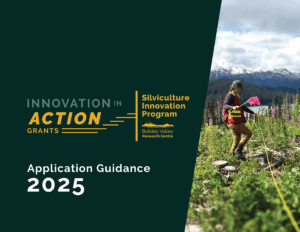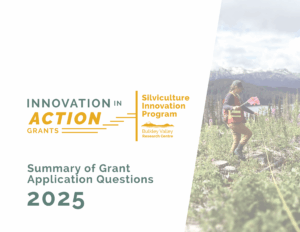Apply to a Grant
SIP Grants
The goal of the SIP grants program is to overcome challenges that currently limit the application of innovative silviculture across BC through knowledge creation and knowledge sharing. The grants program will support research and extension projects that align with SIP mission and values and priorities identified at the Knowledge Summit (March 2023).

Innovation in Action
Status: Closed (OCTOBER 1 – November 30, 2025)
Innovation in Action Grants support operational research and/or implementation of small innovative silviculture projects. It is designed to support shovel-ready projects that need extra support to enhance learnings surrounding innovative silviculture.
Details of the grant:
- Applicants may request between $10,000 – $50,000 CAD.
- Two year grant (activities occurring between 2026 and 2028)
- Projects must deliver tangible outcomes that increase knowledge and extension of innovative silviculture in BC.
- Projects are expected to align with at one of the four eligible themes
- Read Grant Guidance for further details.
About the Grant
Innovation in Action Grants support operational research and/or implementation of innovative silviculture projects. These grants will allow the SIP to distribute funding widely across BC to complete smaller projects and partially support operational trials or reduce financial barriers to completing elements of larger projects already underway. These grants will seek to learn from action – implementing initiatives and trials with clear innovative objectives and data- and knowledge-driven learning opportunities. We will raise awareness of and support extension to facilitate knowledge being translated into action.
These grants are targeted towards operational implementation but open to individual practitioners, organizations, and researchers. Preference will be given to projects that are “shovel ready”, meaning projects where all permissions and permits are in place, and/or support ideas and collaborations that are ongoing or already established. Project support can include planning, data collection, reporting and extension. While preference is for “shovel ready” projects, those that are at a conceptual level are able to apply if the concept aligns with SIP mission and values, priority themes, and demonstrates existing collaborations or partnerships. For example, project support to develop the details of the prescription or implementation plan.
We note that this fund cannot be used to cover basic activities included in the stumpage system (such as layout, roads, logging and reforestation). It is intended to target additional activities applicants may not otherwise have time or resources to complete, but that are critical to knowledge creation and knowledge sharing on innovative silviculture. This could include prescription planning, research and monitoring design, equipment needs, data collection beyond what is required for cutting permit issuance, developing knowledge sharing products, and extension of results. Leveraging existing funds and in-kind support is encouraged.
Knowledge production and transfer is a critical component of each grant and will be measured by outputs including: project reports, published articles, research reports, theses, handbooks, decision support tools, software, methodologies, databases and how project learnings are translated in support of varying forms of knowledge exchange.
Eligibility:
- The SIP Innovation in Action Grant welcomes all individual practitioners and organizations engaging in innovative silviculture to apply. Collaborative grants are encouraged but not required.
- Eligible Applicants include: Individuals; First Nations (bands, Treaty First Nations, and Indigenous Governments with authority for lands and resources in BC); Non-profits whose mandate includes work on forests, forest management or sustainable forestry activities (registered charities, incorporated societies, community foundations); Consultancies whose scope includes work on forests, forest management or sustainable forestry activities; Community forest agreement holders, Woodlot licensees; Research forests; Major licensees; Researchers from academic institutions or nonprofits.
- The lead applicant must be located in B.C.
Priority Themes
Innovation in Action projects are expected to align with one of the following eligible themes:
Additional Resources:
2025 SIP GRANTS Webinar Information Session (recorded November 4, 2025)
This information session webinar presents an overview of the Innovation in Action grants (purpose, eligibility, design), a summary of features for success in applications, and details on how to apply and what to expect in the application itself.
Frequently Asked Questions
This grant is dedicated to improving knowledge of innovative silviculture in BC. In principle, “innovative silviculture” includes systems for harvesting, growing and tending forests where the primary objective is to achieve holistic stewardship of the land. Innovative silviculture systems are driven by an appreciation of ecological, social, cultural, and economic values of forests, where stewardship is focused on maintaining dynamic ecosystem processes and functions.
In practice, innovative silviculture (or sometimes called “alternative silviculture” or “ecological forestry”) could include, but is not limited to: partial harvest systems, thinning, prescribed and cultural fire, intensive silviculture for achieving multiple values, climate adaptation planning and application, and managing for multiple values.
If you are unsure if your project qualifies for Silviculture Innovation Program funding, please reach out.
No, the Innovation In Action grant cannot be used to cover basic activities included in the stumpage system (such as layout, roads, logging and reforestation). It is intended to target additional activities applicants may not otherwise have time or resources to complete, but that are critical to knowledge creation and knowledge sharing on innovative silviculture. This could include prescription planning, research and monitoring design, equipment needs, data collection of data on multiple values beyond what is required for cutting permit issuance, developing knowledge sharing products, and extension of results.
Strong applications will present a collaborative project proposal that aligns with SIP mission and values, and one of the priority themes. Applicants should make it clear how their project will contribute to the growth of innovative silviculture by improving knowledge of these systems in BC.
The cap of the Innovation in Action Grants is $50,000 total (spread over two years).
Yes, previous successful grantees are able to apply for grants in subsequent years on a new project, or for a new phase of the project.
Yes, you are eligible to apply. If the work identified in the original funded project has been completed, you can submit a proposal for the new phase of the project. In this case, the new phase is the implementation, which would require new forms of data collection and approaches to assess and showcase outcomes.
A project that takes place within the province of BC and focuses on outcomes specific to the place-based and/or regional needs of BC forests is eligible. The project lead must reside in BC. If you are interested in applying, we encourage applicants to reach out to potential partners and seek a project lead that is based in BC. A project partner can be located at an institution or organization outside of BC but funds will not be distributed outside of the province.
Yes. We only require that tenure permissions and authorizations are already in place for the activities described in the project proposal.
The SIP follows the OCAP principles to help guide our evaluation of Indigenous leadership on projects. This means that First Nations that lead or co-lead projects have decision-making authority on the project. We are seeking projects that can demonstrate true partnerships. Though many communities might not have capacity to be an administrative lead, there are still ways project team governance can demonstrate decision-making authority and influence on project design, implementation and outcomes. We note that letters of support can also be a strong way to show collaboration with Indigenous communities.
No, it is not necessary that projects are led or co-led by Indigenous projects, but we highly encourage partnerships and collaborations with Indigenous communities. Projects that are not led or co-led by First Nations will be asked to describe how the project otherwise involves or supports Indigenous peoples, communities and organizations and/or considers and/or upholds Indigenous knowledge and values.
We encourage partnerships and collaboration, including provincial government, consultancies, licensees, non-profits, researchers etc.
It should be noted however that funds cannot be awarded directly to the Government of BC. For example, a First Nation can be the grantee and the recipient of the funds and government partner could provide in kind support, and be captured as a project partner.
Letters of support are required when partnering with First Nations to demonstrate true partnership and support authority in decision-making for the project design and implementation. Letters of support are not required at the time of application, but they will be required at the time of offer.
Project proposals only need to select one singular theme for alignment. We recognize that projects may align with different aspects of the themes, so we ask applicants to select the theme that most aligns with the proposed project. In the project description, you are able to note elements of the other themes that are represented by your project, if applicable, though not necessary.
The SIP recognizes and respects data sovereignty for all Indigenous communities. Successful applicants receive Data Sharing Agreements that uphold data sovereignty and recognize there are many reasons data should not be shared publicly. The extension criteria can be met by sharing broad learnings and providing advice, without the release of specific data. You might also consider building a longer review period into your work plan timeline to account for deeper review and approvals from First Nation leadership of extension materials. The SIP can also work directly with grantees on their extension outputs to figure out how to balance both the transparency and learnings, as well as how to contribute in meaningful ways to the right audiences.
We understand the challenge of uncertainty of timing around cultural or prescribed burns. We encourage applicants to consider the many other values that can inform project objectives and project success, outside of a successful burn occurring. Consider how your project can demonstrate meaningful progress surrounding the burn process, and potentially other multiple values, that can be separate from the success of the burn itself.
We understand that extension is likely a new term for many folks, but it is also an opportunity for applicants to share the learnings of your project. To us, extension means we want to hear your stories of collaboration and learn more about your findings in accessible and digestible ways. Extension materials can be fun and engaging (e.g., videos, blogs, art) and/or more technically focused (e.g., extension notes, infographics, prescriptions) or even interactive (e.g., field tours, workshops and sharing with communities of practice). We welcome a range of extension activities and encourage you to get creative when considering how lessons learned from your project can be communicated to others.
Yes, please list potential funding sources and list them as “unconfirmed”. This transparency allows us to understand the scale of the project being undertaken and can help inform the capacity of the project team to carry out the project.
Yes, we encourage the inclusion of “in-kind” funds in the estimated project budget, such as the in-kind contribution of a licensee in designing field layout. This allows us to understand the scope of the project and evaluate the team’s capacity to successfully complete the project.
The SIP grants portal is hosted by Good Grants (goodgrants.com), an online grants management software. Good Grants is designed to use on all major browsers (Google Chrome, Mozilla Firefox, Microsoft Edge, Safari), however sometimes user settings can prevent a browser from working properly. If you are experiencing issues, you can try:
- Enable JavaScript: ensure JavaScript is enabled in your browser settings.
- Clear Cache: clear your browser cache to resolve loading problems.
- Try Another Browser: switch to a different supported browser to see if the issue persists.
- Check Network Settings: ensure your network isn’t blocking JavaScript files.
If you have tried all of the above and issues still persist, please reach out to sip.info@bvcentre.ca.
The SIP grants portal is hosted by Good Grants (goodgrants.com), an online grants management software. If you are being asked for 2FA authentication information, you have already used your email address to create a Good Grants account to apply for another grant in the past! This grant would have required you set up 2FA authentication by downloading an authenticator app, such as Google Authenticator or iPhone Authenticator, to retrieve the code from Good Grants. The SIP grants portal does not require 2FA authentication, so if you are using an email address that has never been used within the Good Grants system, you would not be asked for this information.
The easiest solution is to check to see if you have an authenticator app installed on your phone that would be receiving these codes from Good Grants.
Still no luck? If you changed phones or have since deleted the authenticator app from your phone, you will have to contact Good Grants to regain access to your account by resetting your 2FA. To do so, you can submit a help ticket with Good Grants here: https://help.goodgrants.
Don’t remember setting up an account, or forgot your password? If you forgot your account password, click on the “Forgot password link” once you enter your email. and click Submit. Check this email address (including your junkmail) for the forgot password email. Good Grants also has a guide for applicants that shows how to do this with screenshots: Ultimate guide for applicants
If the above solutions won’t work for you (or you are submitting a last minute application and are short on time!), alternatively you can set up a new account using a different email address.


